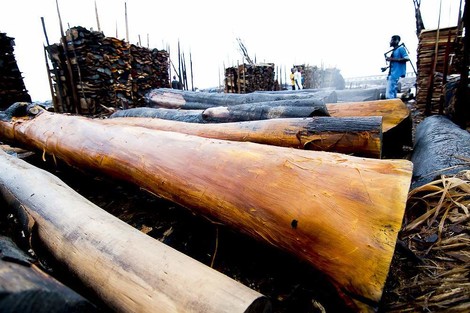Your podcast discovery platform
Curious minds select the most fascinating podcasts from around the world. Discover hand-piqd audio recommendations on your favorite topics.

piqer for: Global finds
Ciku Kimeria is a Kenyan author "Of goats and poisoned oranges" - (https://www.amazon.com/goats-poisoned-oranges-Ciku-Kimeria-ebook/dp/B00HBBWPI6), development consultant, adventurer and travel blogger (www.thekenyanexplorer.com). She writes both fiction and non-fiction focusing on African stories that need telling. She has worked on diverse pieces for various international and local publications including Quartz, Ozy, The East African etc. She has travelled to 45 countries – 16 of them in Africa. 153 countries to go and 63 territories!
"Of goats and poisoned oranges" has been extremely well received in Kenya and beyond. It tells the story of a Kenyan middle aged power couple and their complicated marriage. The novel explores issues of greed, revenge, betrayal and murder. It runs from the 1960s to 2013. It has been described as “Wicked, funny, poignant, wacky, human, a big ball of fun and danger”, “A unique and captivating book”, “Fun and intriguing”, “Impossible to put down once you start reading.”
She recently moved to Dakar, Senegal from Kenya to work on her second novel. She also works at as the Africa Communication Manager at a leading global strategy consulting firm.
She holds a B.S. in Management Science from MIT with minors in Urban Planning and International development studies.
The Fascinating Story Of The Wood Merchants Of Lagos
It was a few years back when I first heard about the area of Makoko in Lagos, where a third of the community lives in structures supported by stilts over water. This particular article looks at a trade that is based in this area, but which has an impact throughout the country - woodworking.
"If you’ve crossed the Third Mainland bridge, you may have seen geometrically arranged logs of wood floating on the water and wondered why they are there, who they belong to and how they stay afloat ... Makoko wood market, an industry with an impact that stretches far beyond the borders of Lagos state and employs thousands. It is a market that has made millionaires out of people who stepped into the business 'without one kobo'.”
The article looks across the value chain - starting with the sawyers who finance bush contractors, who go into the forests across the country to fell wood. Sawyers sometimes send multiple groups of contractors into the forest to maximize profits and minimize risks. It takes between three months and a year to complete the process of felling trees and transporting the logs to the Lagos market. The wood is transported by towing boats and battles "the elements, the tide and other life-threatening danger".
If the wood finally makes it to the bridge, there is jubilation as the sawyers go out to see the wood and measure it to determine its worth.
What's most fascinating about the industry is how little it has changed since it began in the 30s, including the use of old machinery and moving the logs using boats. Also unique is the fact that industry has survived with little to no government support and has its own democratic governing structures that have kept it alive and thriving. However, it's very existence is currently at risk.
"Now, rising costs, the absence of infrastructure, and deforestation threaten the survival of this bustling hub of activity and commerce, say the key players of the business."
For context, $1 is equal to approximately 364 Nairas.
